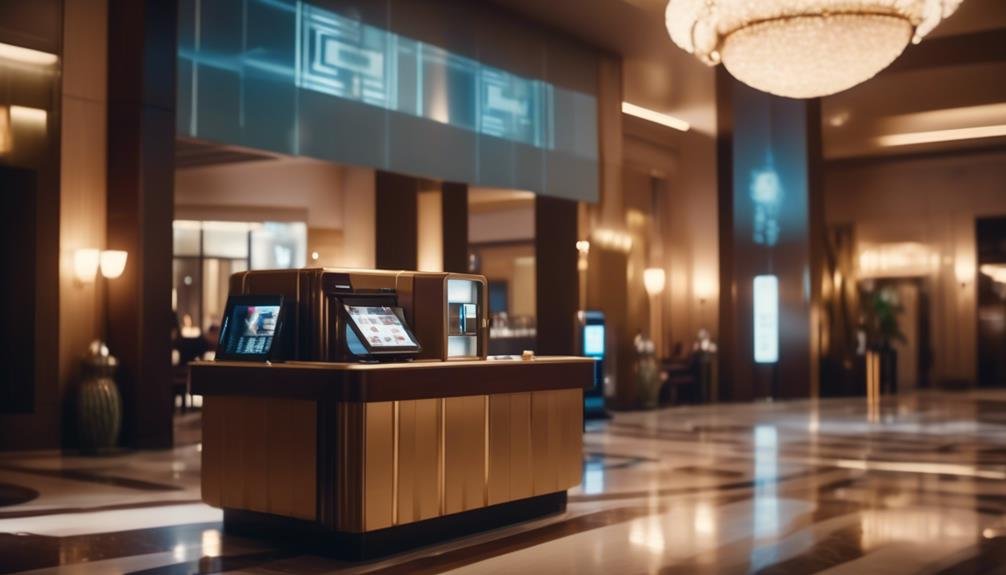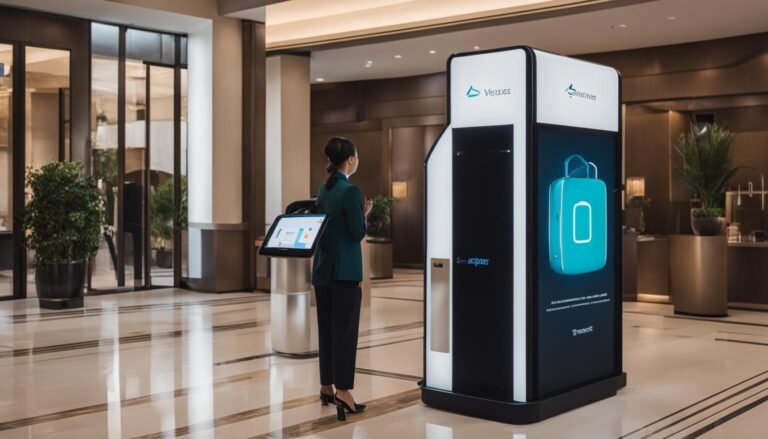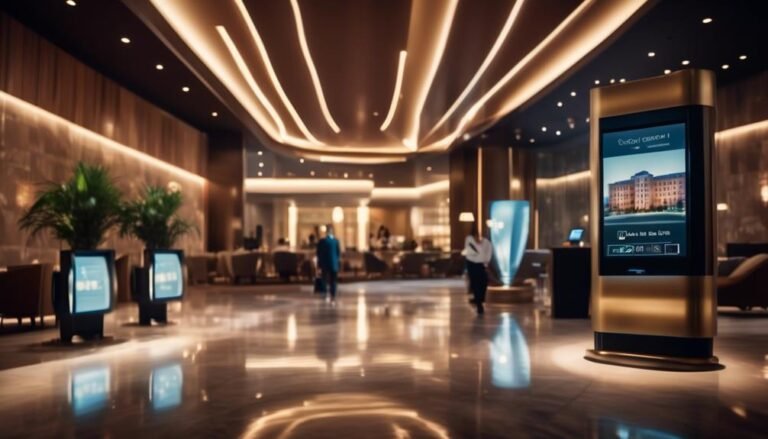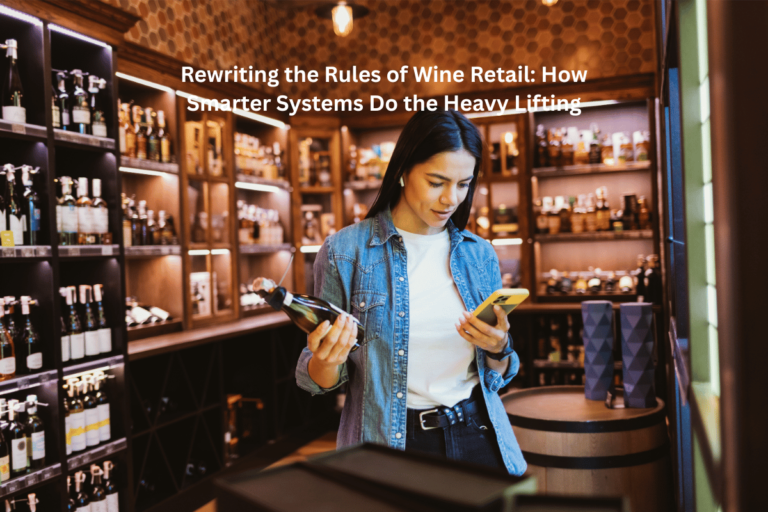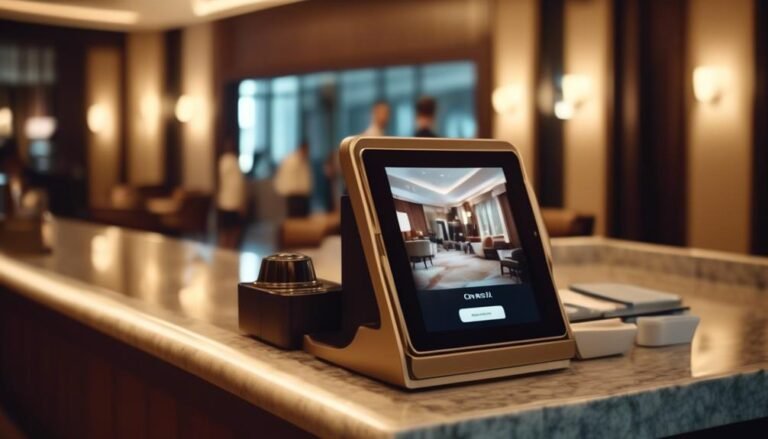The Role of AI and Automation in Hospitality
In the thriving world of hospitality, the integration of AI and automation is rapidly reshaping the landscape. From enhancing guest experiences to streamlining operational efficiency, the potential for innovation in this sector is vast.
But how exactly are these technological advancements revolutionizing the way hotels and resorts operate? And what impact do they have on the human touch that's so essential to hospitality?
As you explore the multifaceted role of AI and automation in this industry, you'll uncover the intriguing ways in which these tools are not just addressing challenges but also presenting new opportunities for growth and evolution.
Key Takeaways
- AI innovation in hospitality enhances guest experiences through personalized interactions and instant responses.
- Automation in hotel room amenities offers convenience and customization for guests.
- AI-driven data analytics anticipate guest needs and preferences, improving operational efficiency.
- AI-powered systems streamline operational processes, optimize staff scheduling, and inventory management, leading to cost savings and efficiency.
Enhancing Guest Experiences
Using AI and automation can significantly enhance your guest experiences at hotels and restaurants. AI innovation in the hospitality industry has led to personalized guest interactions, streamlined processes, and improved guest satisfaction. For instance, AI-powered chatbots can provide instant responses to guest inquiries, making the communication process efficient and seamless. These chatbots can also make personalized recommendations based on guest preferences, enhancing the overall experience.
Additionally, automation in hotel room amenities, such as automated check-in processes and smart room controls, offers guests convenience and customization, further contributing to their satisfaction.
Moreover, AI-driven data analytics enable hotels and restaurants to anticipate guest needs and preferences, allowing for proactive service and personalized offerings. By analyzing guest feedback and behavior, establishments can continuously improve their services, ultimately leading to higher guest satisfaction.
AI innovation also plays a significant role in enhancing the overall efficiency of operations, enabling staff to focus more on delivering exceptional service and personalized experiences to guests.
Streamlining Operational Efficiency
To streamline operational efficiency in hospitality, you can implement AI-powered systems that optimize staff scheduling and inventory management.
Operational automation through AI can significantly improve efficiency by automating routine tasks such as shift scheduling, taking into account factors like staff availability and skill sets. This ensures that the right employees are scheduled at the right times, reducing labor costs and minimizing overstaffing or understaffing situations.
Additionally, AI can track inventory levels in real-time, automatically placing orders when supplies are running low, and helping to prevent both stockouts and overstocking. This not only streamlines operations but also minimizes waste and reduces carrying costs.
Efficiency improvement is further facilitated by AI's ability to analyze large amounts of data to identify areas for optimization. For instance, AI can analyze customer traffic patterns to predict peak times, allowing for proactive staffing adjustments. It can also provide insights into customer preferences, enabling more targeted inventory management.
Optimizing Service Delivery
By implementing AI-powered systems, you can further enhance service delivery in hospitality, utilizing data insights to optimize customer interactions and streamline operational processes.
Service automation and AI integration play a crucial role in optimizing service delivery in the hospitality industry. Here's how:
- Personalized Guest Experiences: AI enables you to analyze guest preferences and behavior to tailor personalized recommendations and services, enhancing overall guest satisfaction.
- Efficient Resource Allocation: AI helps in forecasting demand and allocating resources more effectively, ensuring that staff are available when and where they're needed the most.
- Real-time Customer Support: AI chatbots can provide instant responses to customer queries, enhancing the speed and efficiency of customer service.
- Data-driven Decision Making: AI systems can analyze large volumes of data to provide valuable insights, enabling you to make informed decisions to improve service delivery and operational efficiency.
Personalizing Guest Interactions
Enhance guest satisfaction by leveraging AI to customize interactions based on their preferences and behavior. By utilizing AI applications, hospitality businesses can gather and analyze guest data to provide personalized recommendations, ultimately leading to improved customer satisfaction. Here's a breakdown of how AI can be applied to personalize guest interactions:
| AI Applications | Guest Preferences |
|---|---|
| Data analysis | Room temperature |
| Natural language processing | Food preferences |
| Facial recognition | Leisure activities |
| Chatbots | Service preferences |
Addressing Challenges and Opportunities
Addressing the challenges and opportunities in AI and automation within the hospitality industry requires a proactive and strategic approach. It's essential to navigate these advancements thoughtfully to maximize benefits and minimize potential drawbacks.
- Challenges: The integration of AI and automation may pose challenges in terms of workforce impact. Ensuring that your employees understand and embrace these technologies is crucial. Additionally, managing the transition to automation without alienating guests is a delicate balancing act.
- Workforce Impact: Understanding how AI and automation will affect your workforce is essential. This includes potential changes in job roles, reskilling needs, and maintaining a positive work environment during the transition.
- Opportunities: Embracing AI and automation presents opportunities for significant cost savings. Streamlining processes, optimizing resource allocation, and enhancing operational efficiency are just a few of the potential benefits.
- Cost Savings: Leveraging AI and automation can lead to substantial cost savings in the long run. By automating repetitive tasks and optimizing resource utilization, businesses can achieve greater financial efficiency.
Navigating the challenges and harnessing the opportunities presented by AI and automation in hospitality requires a strategic and forward-thinking approach.
Conclusion
Just as a chef uses a variety of tools to create a masterpiece, the hospitality industry can utilize AI and automation to enhance the guest experience, streamline operations, and personalize interactions.
Embracing these technologies is like adding the perfect blend of spices to a dish – it elevates the overall experience and leaves a lasting impression.
By addressing challenges and seizing opportunities, AI and automation can revolutionize the hospitality industry and set the stage for a new era of hospitality excellence.

